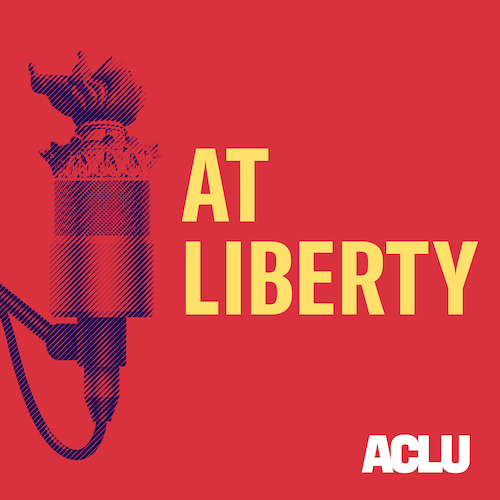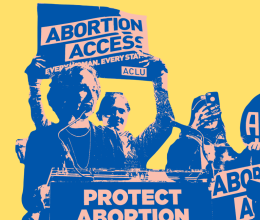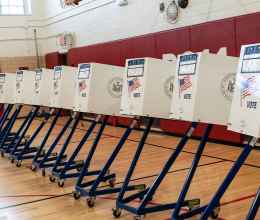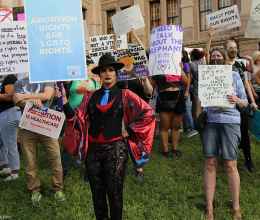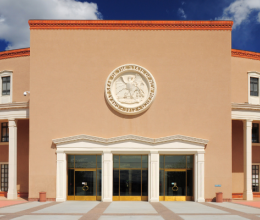
As attacks against trans youth continue across the country, the ACLU is shining the spotlight on those who are often at the center of harmful anti-LGBTQ rhetoric and discourse: transgender youth.
Unfortunately, trans youth continue to face malicious attacks on their safety and dignity as lawmakers actively seek to invalidate and infringe upon their right to live and express themselves as they choose. With almost 500 anti-LGBTQ bills circulating across state legislatures nationwide, more than 25 percent of those bills attempt to restrict or ban gender-affirming care for trans kids, and nearly 50 percent prevent trans students from participating in sports or prohibit LGBTQ safe spaces or discussions of any kind in schools.
What trans kids need most as growing kids and adolescents is not more pressure to conform or change themselves, but endless support to continue to grow and thrive as they are.
In a recent episode of ACLU’s At Liberty podcast, we talk to three trans kids — Hobbes, Jayden, and Dylan — about their lives, their experiences, and their perspectives as part of the trans community.
Hobbes, a 16-year-old who’s passionate about advocacy and robotics, recently helped organize a trans prom in front of the U.S. Capitol, and has dreams of building a prosthetic in the next few years. Jayden, a 15-year-old from Illinois, plans to pursue a computer science degree so she can combine her love for art and technology to share meaningful stories. And Dylan, a 17-year-old who wants to be an educator, is a plaintiff in our Brandt v. Rutledge case, who fought and won the battle to protect transgender youth and their families’ right to access gender-affirming care in Arkansas.
These kids face challenging circumstances to live as who they truly are, and still, as At Liberty host Kendall Ciesemier puts it, “Trans kids are simply kids. We should listen to and embrace them as such.”
Here, they share their stories in their own words.
This conversation has been edited and condensed for clarity.
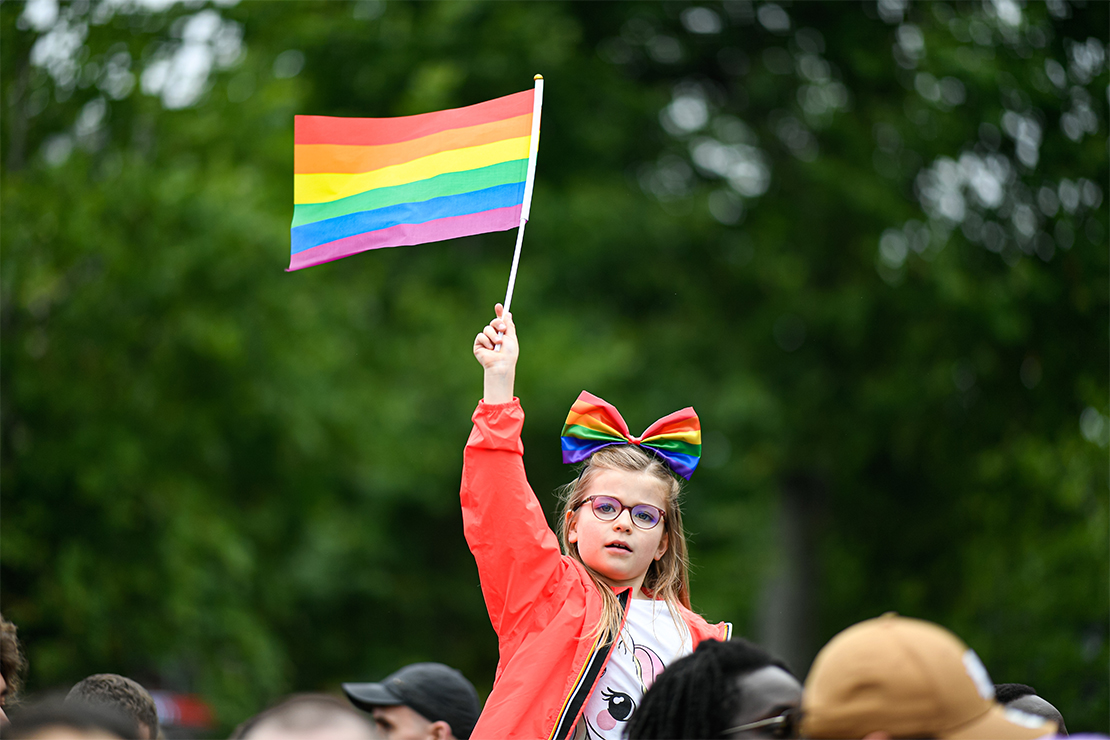
Credit: Victor Velter / Shutterstock
On finding supportive peers and community
Hobbes: “For me, my biggest supporter, my biggest advocate is my father. He was there for me since day one. You know, he’s constantly educating himself about everything within the transgender community, which I find is very, very admirable. A lot of people kind of just take whatever they’re given at face value and assume that how it is is fine and they’ll just move on with whatever they’re given. But my father will actively search out more information, find out how he can better support not just me, but the community as a whole. That’s kind of why he’s such a large advocate. It inspires me to be like him. He’s one of my role models. I just really love my dad.”
Jayden: “So typically when I go to school, I have a smaller support group of friends. They’re always there for me. But when I was younger, like in middle school, around the time when I came out, it was really difficult for me because all the teachers and all the people that I was friends with didn’t see me the way that I saw myself. And it was really difficult for me to try to get, you know, for me to try to get better. With everybody seeing me as the opposite gender, what I identified as, and I don’t think that they were doing it to hurt me. I think it was just difficult for them and they didn’t understand. But when I got to high school, I was able to change like high school districts because I moved out of the state I was in at the time. It was like a fresh start. It was so much easier for me because I introduced myself the way that I saw myself, and it was way easier. And the people who I am still friends with today are the ones that sort me out and were just there supporting each other.
“Last year, I think it was me and a bunch of friends. I had them come over so we could, like, have dinner. We were going to go to homecoming as a group together. And so I had them bring all their makeup and we ate food at my house and we got ready. And I didn’t have any at the time because I’m like, I don’t know how to use it. So they let me use their makeup and they made sure that I felt pretty and they made sure that I was confident in the way that I looked because they just cared about me.”
Dylan: “I’d say I was friends with all the guys, you know? Third or fourth grade, I grew up playing football outside at recess with them, and I was friends with most of those guys up until I came out. And that was kind of the turning point for them that they didn’t think that that was okay. And so I lost all of them.
“But then I gained so many more people who loved me and supported me unconditionally. And so I’ve got my group of friends, my best friend who just graduated has helped me through all these years of high school. And I am absolutely in awe of her. She grew up with a very different mindset until she met me and she’s become one of my biggest supporters. And I really look up to her for that because it takes a lot. You know, growing up in the South and growing up with a mindset where maybe that’s not okay for a lot of people, I’ve just become very close with a small group of people. But that’s fine with me, and they’re all very supportive teachers at my school.
“I have my principal. I love her with my entire heart. From the moment that I came to her one day and was like, ‘Hey, this is going on,’ she made it a point to check in with me all the time. If there was ever a situation that needed to be handled, she handled it right then and there.”
On seeking gender-affirming medical care in the face of legislative bans
Dylan: “We have had many conversations within my family about this. If for some reason I can’t get my hormones here in Arkansas, we would have to leave. And that is not going to be easy. My mom owns a small business here in town. I have a job. I’m going into my senior year, and my brother is going and starting his sophomore year. He’s been doing care for the past four years and really enjoys it, is really in love with his team. We have friends. Our entire family is in this town. And my mom is a single parent. It would be really hard to leave, but we would have to do it because to me, not getting it isn’t an option.
“I don’t think that that would end very well. Just because I know how happy I am now and the thought of having to lose that, I feel it would be way worse than it was when I never started it.”
Jayden: “Hearing about the trans health care ban that passed in Idaho was shocking because I didn’t know how a bill like this could come out in the first place.t It’s blatantly attacking trans people, and I don’t get how anybody could see it any other way. It’s either people refuse to see it for how it is or just don’t care. It was shocking. The moment that I saw that it was on the table in Idaho, I was really, really hoping that it wouldn’t happen. But, you know, part of me realized that this is something that we’re going to have to fight hard. It’s really harmful to think that the people who govern your state don’t have your best interest in mind, that they’re out there for everybody else who is in the majority and are willing to attack people in the minority in order to appease those in the majority.
“In the event that, you know, I’m not able to get the medication I need to … I’ve been on estrogen since, like, February I think. And I’ve talked to my doctor about this. We’re trying to come up with a plan. Worst case scenario … I can just go to Oregon to get that. But that’s still going to be rough. Because that means a whole, you know, changing of doctors and all those complications or whenever I need those refills, I need to go to Oregon to get them.”
Hobbes: “I’m fully aware of everything that’s happening in the country. And I feel the main thing, the main emotion I have is somewhat being overwhelmed, of being upset and frustrated because while it’s not happening directly to me, it’s happening to people in my community. You know, I connect to the both of you in the sense that when I started my hormone therapy, I felt a thousand times better than beforehand, right? I felt like I was finally able to open the door and start my way. Progress towards the person that I know I am and form that proper self. So to imagine, even just fathom the fact that in certain places they’re trying to or are actively barring other people from it and inhibiting your ability to feel yourself. It’s … it’s sort of malevolent. It hurts me to even just hear, you know, my heart goes out.
“It does also move me to the advocacy that I’ve been trying to get into. It moves me to know that when I helped to put on events like the trans prom, I’m not just doing it for the party guests, but I’m doing it for the message and the effect which it spreads, which will in turn help the entire community. It helps me stay motivated. It helps remind me exactly what I’m working for.”
On encouraging other trans kids in the community
Dylan: “I think that something that I have said since I started advocating, something that I end most interviews or speeches with, is you are not alone. I feel like people just need to hear that because for a while I thought that I was, until I realized I wasn’t. You are absolutely not alone. There are so many people willing to fight for you and that are fighting for you. So don’t for a second think that you’re alone.”
Hobbes: “Yeah. I have to say, I completely second that notion, and I feel like to add on to that, with all these people who are fighting and all these people who are constantly supporting I hope that one day in the future we will have a society in which saying that you are transgender is no different from saying that you are just a person, right? That one can identify themselves however they please without anyone casting a second glance.”
Jayden: “And I really hope that for those of you out there that are younger and you find yourself caught in the hurricane, that is the quote unquote “trans debate,” that you can find the eye of that hurricane and just learn to be yourself. Because, you know, as the recurring theme here, you’re not alone. And no matter how far you sink, there will always be someone there that is willing to lift you back up.”
You can listen to the full episode here.
